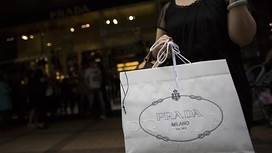手机版 欢迎访问云霄霄(www.wx10.com)网站

May Liu earns about $2,500 a month as an office worker in Hong Kong, but she spends about 10 to 15 times that on luxury goods, buying everything from Prada handbags to products from US cosmetic brand Fresh.
May Liu是一名在香港工作的办公室文员,每月收入约2500美元,但她在奢侈品上的花费是这一金额的10至15倍,购买的产品从普拉达(Prada)的手袋到美国馥蕾诗(Fresh)的化妆品无所不包。
While Ms Liu loves shopping, she buys mostly for others in her role as a “daigou” agent – a growing breed of people who specialise in helping mainland Chinese consumers secure products from overseas.
虽然May Liu喜欢购物,但她主要是作为一名“代购”帮别人买东西——作为一个人数日渐增长的群体,代购专门帮助中国内地顾客从境外购买商品。
She started her daigou business a year ago as a way to earn more money, but the young mainland Chinese was soon bringing in up to $10,000 a month. Ms Liu now has about 2,600 clients, who use Weibo, China’s equivalent of Twitter, and WeChat, a messaging app, to order goods.
她一年前开始从事代购业务,以增加收入,但不久之后,这位来自中国内地的年轻人每月最高就可进账一万美元。May Liu现在约有2600名客户,这些客户通过微博(Weibo,相当于中国的推特(Twitter))以及聊天应用微信(WeChat)来下单订购商品。
“I didn’t know how much money I would make. I didn’t have any expectation of profits,” says Ms Liu, who asked to use a pseudonym. “I only knew it would be profitable.”
May Liu要求使用化名。她说:“我不知道自己能赚到多少钱。我对利润没有任何预期。我只知道这一行能赚钱。”
She has not given up her day job, realising that being a daigou agent, while highly profitable, can also be illegal.
她没有辞去正职工作,因为她明白,代购这一行虽然利润丰厚,但可能是违法违规的。
Some agents focus on ferrying goods from Hong Kong to mainland China.
一些代购专门从事将商品从香港代送到中国内地的业务。
But the web-based phenomenon has spread to expatriate Chinese who are help compatriots back home buy brands from cities such as Paris, London, New York, Hong Kong, Tokyo and Seoul.
但这一兴起于网络的现象现已扩散到了旅居海外的中国侨胞群体,他们帮助国内同胞从巴黎、伦敦、纽约、香港、东京以及首尔等城市购买名牌商品。
The daigou boom is an example of how ecommerce is rapidly transforming the Chinese retail market.
代购热潮是一个明证,表明电子商务正在快速改变中国零售市场的面貌。
According to Chinese media, there are hundreds of thousands of people working in the daigou business. A search for the term on Alibaba’s Taobao, China’s largest online marketplace, produces more than 240,000 virtual stores and nearly 15m items from child car seats through air purifiers to pocket printers.
据中国媒体报道,目前有好几十万人在从事代购业务。在阿里巴巴(Alibaba)旗下网站淘宝(Taobao)上搜索“代购”一词,会显示出超过24万个网络店铺以及近1500万种商品,从儿童汽车座椅、空气净化器到便携式打印机无所不包。淘宝是中国最大的在线交易平台。
The China e-Commerce Research Centre says the daigou market grew 19-fold between 2008 and 2012 when it reached Rmb48bn, and reckons that it rose again in 2013 to Rmb74bn ($12bn). According to a recent study by Bain, about 60 per cent of the Chinese consumers who buy luxury goods have used daigou at some point.
中国电子商务研究中心(China e-Commerce Research Centre)表示,代购市场在2008至2012年间增长了19倍,规模达到了人民币480亿元,2013年代购市场继续增长,规模达到了人民币740亿元(合120亿美元)。贝恩公司(Bain & Company)近期进行的一项研究显示,约有60%的中国奢侈品消费者曾经使用过代购服务。
The business is thriving for several reasons. Many Chinese believe the same product is better made when bought overseas because of the mainland’s uneven reputation for quality.
代购行业蓬勃发展主要是由于以下几个原因。很多中国人认为,同一种产品,购自海外的质量会好一点,因为中国大陆的产品有着质量不稳定的名声。
The rising strength of the renminbi, the growing purchasing power of Chinese consumers, and high-profile food safety scandals in China, have also spurred demand for safe and high-quality foreign products.
人民币汇率稳步走强,中国消费者的购买力不断提升,中国食品安全丑闻引起公众关注,也都刺激了市场对安全性高、质量又好的外国产品的需求。
Mo Daiqing, an analyst at the e-commerce research centre, says the main reason Chinese are turning to daigou is because of hefty import tariffs on luxury goods. China levies a 50 per cent duty on cosmetics, one of the dominant daigou categories, and that is before the imposition of the standard 17 per cent value added tax that is added to imported luxury products.
中国电子商务研究中心的分析师莫岱青表示,中国消费者转向代购的主要原因是,国内对奢侈品的进口关税太高。目前中国对化妆品征收50%的关税(这是代购商品中的一大主要门类),而在此之后还要再对进口奢侈品按标准征收17%的增值税。
“The same brands of milk powder, cosmetics and handbags are much cheaper in Hong Kong, the US, Japan and South Korea than in mainland China,” said Ms Mo.
莫岱青表示:“同样品牌的奶粉、化妆品以及手袋,在香港、美国以及韩国买的要比在中国大陆便宜很多。”
But the industry is increasingly drawing attention from customs officials in mainland China and Hong Kong, particularly with the rising numbers of so-called parallel traders who take advantage of multi-entry visas to cross the border at the southern Chinese city of Shenzhen many times a day, carrying products for resale that they do not declare at customs.
但代购行业正日益受到中国内地和香港海关官员的关注,特别是人数越来越多的“水客”(parallel traders)。这类人利用一签多行政策,在中国南方城市深圳每日穿越边境多次,将所携带的未报关商品在境内转手出售。
Dong Yizhi, a lawyer who specialises in ecommerce, points out that the daigou business is not illegal if the agents pay import taxes, but says that if agents pay duties the premise of the business becomes moot.
专长电商领域的律师董毅智指出,如果代购人员支付进口关税,那么代购业务就不是违法的;但在这种情况下,代购将失去存在的意义。
“If they pay customs duties, the price disparities will be much smaller and they won’t make money,” said Mr Dong.
董毅智表示:“如果代购支付关税,国内外商品的差价将显著缩窄,代购就赚不了什么钱。”
Chinese citizens can legally import Rmb5,000 ($823) of duty-free goods for personal use each time they return to the mainland. But Shenzhen customs officers are taking a tougher line on parallel traders who cross the border back into the mainland more than once a day with goods over the value of Rmb500.
中国公民从境外返回中国大陆时,每次可以依法携带价值不超过人民币5000元(合823美元)的免税商品供个人使用。但深圳海关对每天往返境内超过一次的水客采取了更加严厉的标准:每次携带的免税货品价值不得超过人民币500元。
Liu Lizhen, a Shenzhen customs official, said the move was aimed at clamping down on the abuse of the multiple re-entry system.
深圳海关官员刘丽珍(音译)表示,此举旨在打击滥用多次往返签证机制的情况。
This has become a more serious issue in Hong Kong since 2009 when it started allowing Shenzhen permanent residents to enter the former British colony without restrictions.
自2009年以来,水客在香港已经成了一个愈发严重的问题。香港自2009年开始允许深圳市永久居民不限次数前往这片曾经的英属殖民地。
“We once found a person who had crossed the border 26 times a day,” said Ms Liu.
刘丽珍称:“我们曾经发现过一个人,他在一天之内穿越边境26次。”
According to the Shenzhen customs bureau, more than 20,000 parallel traders operate at the six land border checkpoints between Hong Kong and the southern Chinese city.
来自深圳海关的信息显示,在香港与深圳之间的6个陆路口岸往返的水客数量超过了两万人。
Hong Kong’s immigration department said just over a thousand parallel traders were arrested last year for breaching the terms of their stay in the territory.
香港入境事务处表示,去年超过1000名水客因为违反在香港境内的逗留条款而被逮捕。
Despite the crackdown, May Liu, the daigou agent, says she is not worried, and still travels to Shenzhen a few times a week.
虽然面临政府打压,但作为一名代购的May Liu表示自己并不担心,仍然每周数次前往深圳。
“Carrying so much stuff across the border every time provides me with a lot of exercise. I don’t even have to go to the gym,” jokes Ms Liu.
她开玩笑称:“每次带这么多东西穿越边境对我来说是强度很大的锻炼。我甚至都不用去健身房了。”
‘Brands are much cheaper in Hong Kong, the US, Japan and South Korea than China’
“名牌商品在香港、美国、日本以及韩国的售价远比在中国内地便宜。”